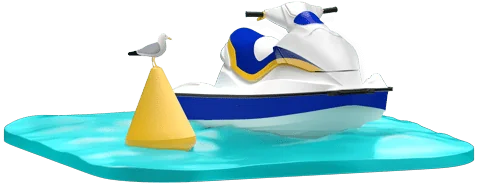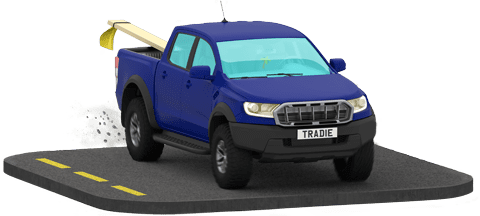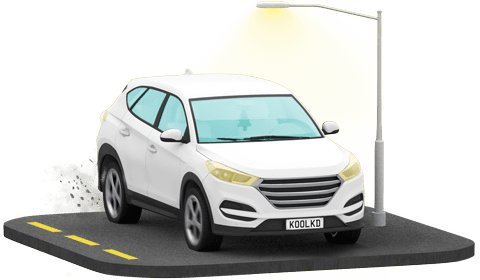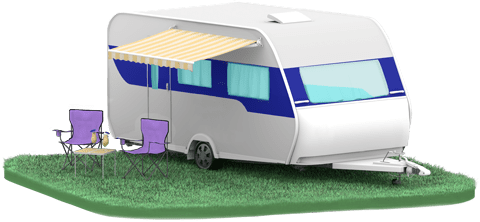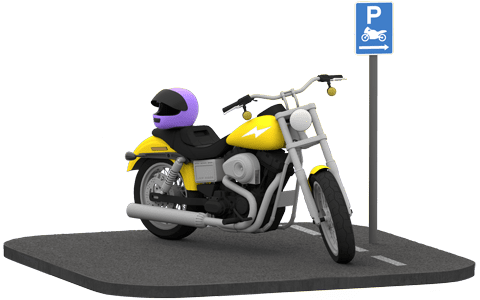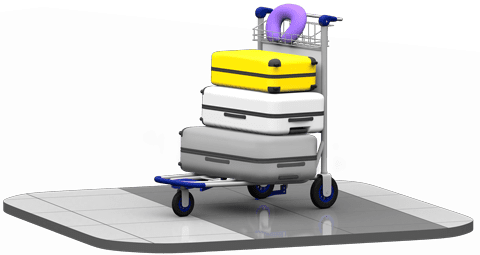Find out more about:
Insurance, explained
We know insurance lingo can be a bit confusing. While our policies are WriteMark™ approved, we've put our heads together to explain some common terms plus a few others for good measure.
A note from our legal friends: this is a list of commonly used terms or phases that we have helped simplify into plain language. These explanations are to help explain insurance jargon and don't substitute your policy wording. Please refer to your policy wording for the official definition.
All insurance

Accidental
A whoopsie... something unintended and unexpected by you that causes damage.
Asset
Is the thing you own that you're insuring.
Betterment
We'll replace what you had to a higher standard than before it was damaged or lost. Meaning you are better off after the claim.
Certificate of Insurance
Much like a birth certificate, that shows who you are, the Certificate of Insurance outlines your personal policy info and cover levels. We send this out when you buy, renew or make a change to your policy.
Duty of disclosure
Honesty is the best policy in any relationship. It's important to answer all questions truthfully when buying insurance as well as letting your insurer know if something changes.
Endorsement
An alteration in writing to the standard terms of the policy wording.
E.g. If your house has a special feature above what's normally covered, it may be covered under an endorsement on your policy.
Excess
Is the amount you need to pay if you make a claim and it's accepted.
E.g. If you have an excess of $500 on your house insurance and there's unexpected damage, you pay the first $500 towards the claim.
Interested party
Anyone you've told us about who has a financial interest in the asset you're insuring.
E.g. your parents, a bank or finance company. Anyone that loaned you money to buy it.
Levy
A levy is a government fee that all insurance companies are required by the government to collect and pass on to other organisations.
E.g. NHI levy, Fire and Emergency levy. For more detail, see our Government levies explained blog.
No claims bonus
The discount you get on your premium when you haven’t made a claim for a year or more.
E.g. If you don’t claim on your policy for a year, you'll get a discount on your premium the next. Limits apply.
One event, one excess
If something happens and you need to claim on multiple car, house or contents policies, you'll only pay one excess.
E.g. A car drives through your garage and runs over your bike, you pay one excess for both your bike and your home even though you are claiming on two policies.
Policy wording
All the details on what is and isn't included in your policy. It's the wording for the contract of insurance we have together.
Fun fact, our policy wording is WriteMark approved, meaning it's in plain language and not as hard to understand as you may think.
Premium
The amount you pay every fortnight, month or year for your insurance.
Principal
You may have had one at school, but in the insurance world the principal is also known as the policyholder.
Reinstatement
If you accidently let your policy expire and wanted your cover back, we may resume your cover as if it had never expired.
Reinsurance
Reinsurance is insurance for insurance companies. If there's a large event that affects a whole community, reinsurance is there to help insurers cover the cost of claims. It acts as a guarantee that if something major happens, we can still pay out your claim and get you back on your feet as quickly as possible. The cost of reinsurance can sometimes increase, this is reflected in your insurance premium.
Boatie
A boating enthusiast. Commonly seen wandering around marinas or by boat ramps, especially in summer months often wearing boat shoes.
Check out our blog on Coastguard bringing boaties home safe.
Knot
Knot just for rope...a knot also refers to the measure of speed a boat travels on the water.
1 knot = 1.852 kph.
Launch
Large, powered, moored boats. Also known as a cruiser.
Did you know, when you insure your launch we'll also cover your tender if you have one.
Lay-up cover
We'll give you a discount if you don't use your boat for a period of time.
Check out our blog on How lay-up cover can enhance your boating experience.
Marina liability
Your legal liability outlined in the terms and conditions of a lease or agreement with the marina in NZ that you store your boat.
Nautical mile
A unique distance of measurement for the sea. 1 nautical mile equals 1.85km.
Off-beach boats
Smaller boats such as a Laser, Optimist or the classic off-beach dinghy.
Check out our blog on How to launch a boat.
Operational limits
The distance the skipper or the boat can safely travel. In NZ these are commonly defined by enclosed, inshore, coastal, and offshore distances.
Personal watercraft
Like a motorcycle for the sea. Covers all Jetski's, PWC and Pole Ski's.
Runabout
From Fi Glass to Frewza, Cuddy Cabin to Bow-rider, a runabout is a trailerable powerboat.
Salvage
The process of recovering a boat after a shipwreck or other maritime casualty.
Sum insured
The maximum amount paid if your boat is damaged beyond repair. The amount should cover the cost to replace your vessel and any componentry. If you have a trailer, add it as an optional benefit.
Tender
Is the little boat you use to get to your big boat.
Trailer Sailer
The name of this one gives a bit away. This boat combines the flexibility of sailing coupled with on land storage.
Yacht
Yachts are powered by the wind, and we make getting cover for your yacht a breeze.
Assets
These are the items owned by the business like desks, chairs, computers, vehicles, machinery, and tools. The key items in your building that you can't operate without.
Commercial vehicle
This is a vehicle used as part of conducting business including moving people and tools of the trade. It could be anything from a tradie's ute, on road salesperson's car to a truck.
Employer's liability
If one of your employees is injured at work, and it’s not covered by ACC, they could make a claim against you. This covers damages for claims made against you as well as costs to defend any claims or proceedings.
General liability
Also known as public liability, this looks after any costs you’re legally responsible for if you accidentally damage someone else’s property or injure someone.
Home office
An easy test is to ask yourself: "Am I selling a product or service from my home in exchange for money?"
Think about whether you’ve got a website, stock, equipment, or even a business Facebook page where you promote yourself.
If the answer is yes to any of these – congratulations, you probably have yourself a home office and business.
Check out our blog on Does my home office need business insurance?.
Agreed value
The value of your car that we’ve agreed to at the time of insuring your car or at any change in cover or at renewal. This is a set amount you’ll get if your car is written off. So you know how much you’ll have to spend on a new one.
E.g. We agree to pay you $6,000 if your car is damaged in an accident and we decide it is a total loss.
Check out our blog on Market vs Agreed value for car.
Market value
This is the amount you’d get for your car if you were selling it today. It changes over time and may be less than you think it is.
When a claim is made on a car with a market value, our valuer will review cars of the same make, model, kms, year and condition as your car to define what the current market value is.
Check out our blog on Market vs Agreed value for car.
Modifications
Changes or alterations to your car, over and above what it comes with as standard from the factory. This could be anything from tinted windows to suspension, wheels and tyres. It's not anything you add to your car - some things we'd call accessories.
Natural disaster damage
Damage that occurs during a natural disaster, such as a flood, earthquake, natural landslip, volcanic eruption, hydrothermal activity or tsunami.
Third party
This is the minimum (and also cheapest) level of car insurance available. It covers damage your car causes to other people's car or property.
Often mistaken for low value vehicle insurance, it's important to remember that if an accident occurs this covers the costs for other people's repairs which can be expensive.
Check out our blog on Comprehensive or third party insurance.
Two year replacement from new
Insure your new car with Tower and if it's written off, we'll replace it with a new car of the same make, model and variant inside the first two years.
Camper
Not only someone who stays in tent, a camper is another name for campervan.
Campervan
A campervan is basically the same as a motorhome although likely smaller. It's a self-propelled vehicle that usually includes somewhere to eat, sleep, and wash.
Caravan
A caravan is a towed vehicle (no motor of it's own) that usually includes somewhere to eat, sleep, and wash.
Market value
This is the amount you’d get for your motorhome if you were selling it today. It changes over time and may be less than you think it is.
E.g. How much it would cost to buy a motorhome that’s the same model, age and condition.
Repair guarantee
If you choose to have your repairs carried out by a priority repair partner, we’ll provide you with a guarantee on those repairs for as long as you own the vehicle.
Hidden gradual water damage
Water damage that happens over time.
E.g. Leaking underfloor pipes you don't notice until the damage is done to your insured contents. Limits apply to this cover, be sure to read the policy wording.
Home office equipment
Includes furniture and equipment that you use for your job while working from home.
E.g. desk, office chair, laptop, monitors, but not tools of trade - you'll need a business policy to cover those.
Household items
Includes most things that you may have in your home. If you were to turn your house upside down and shake it, it's all that stuff that would fall out.
Anything from cutlery, electrical appliances (not permanently plumbed or wired in), food, furniture, household linen, rugs, to pots and pans.
New for old
We'll replace an old item with a new version, should it be stolen, damaged beyond repair or lost.
E.g. Your stolen handbag that’s a few years old is replaced with a brand new one.
Personal effects
Includes almost anything you use or wear. Make sure you think of everything you have in your bedroom and bathroom cupboards.
E.g. clothes, cosmetics, contact lens, glasses, handbags, head phones, jewellery, laptops, mobile phones, shoes, even your false teeth if they come out!
Recreation and leisure equipment
Love hitting the slopes, the waves or the golf course? Leisure and recreational equipment like surfboards, kayaks, e-scooters or e-bikes and camping equipment are all covered under your contents insurance.
Replacement value
The amount your insurer pays to replace an item should it be lost, stolen or damaged beyond repair.
Situation
The Situation is the address that is shown on your certificate of insurance.
Sum insured
Is the amount you've chosen to insure all your stuff for, and it's the most we'll pay if you lose everything.
Check out our blog on How to calculate your contents value, the easy way.
Contract works
Contract works is the commonly used name to describe insurance a home owner may need to cover renovation work that require building consent or of a high value.
It could also be known as renovation insurance or renovation cover.
Check out our blog The 101 on renovation cover.
Damage caused by a natural hazard
Physical damage or destruction as a direct result of an earthquake, landslide, volcanic activity, hydrothermal activity or tsunami.
Dwelling
Another name to describe the house you live in.
EQCover
Is cover provided under the EQC Act 1993 for damage to residential buildings, and land caused by certain natural disasters such as earthquakes, landslips, volcanoes and tsunamis.
A claim for damage that first occurred before 1 July 2024 is subject to the EQC Act and is referred to as an EQCover claim.
For more information visit the Natural Hazards Commission Toka Tū Ake website.
Hidden gradual water damage
Water damage that happens over time.
E.g. Leaking underfloor pipes you don't notice until the damage is done. Limits apply to this cover, be sure to read the policy wording.
Check out our blog Tower translates: Hidden gradual water damage
Liability protection
Covers any costs you are liable to pay for damage you cause to others.
E.g. You chop down a tree on your property and it lands on your neighbour’s home.
Lifestyle block
A semi-rural property with a house and small block of land. It may even have a flock of sheep or some chickens!
Maintenance period
You may see this term in our Contract works - Renovation cover policy. A maintenance period gives you 12 months after the renovation work has been completed to identify any damage that went unnoticed during the construction that needs to be repaired.
Minor alteration
DIY renovations often fall into this category. These are small improvements to your house that don't include structural alterations or require building consent.
E.g. painting walls, new carpet or flooring.
NHCover
NHCover is provided by the Natural Hazards Commission Toka Tū Ake (NHC) and covers damage to residential buildings up to the first $300,000 plus GST, caused by a natural hazard event including earthquakes, landslides, volcanic activity, hydrothermal activity, tsunamis, and natural hazard fire that occurs because of any of these hazards. The NHC also provides limited cover for your land that has been damaged by a natural hazard listed above as well as by storm and flood.
A claim for damage that first occurred on or after 1 July 2024 is subject to the NHI Act and is referred to as an NHCover claim.
For more information visit the Natural Hazards Commission Toka Tū Ake website.
Principal supplied goods
Our contract works policy refers to the Principal, who is also known as the policyholder and often the home owner.
They may buy fixtures and fittings like taps, basins, kitchen appliances or other materials themselves rather than leave those purchases to the tradespeople. These items are what we call Principal supplied goods.
Any items purchased by the home owner for the renovation that aren't included in the builder's contract, must be insured at a specified amount which is then detailed on the Certificate of Insurance.
Risk based pricing
The chance of your home being damaged by a natural disaster, like a flood and earthquake, is different depending on where you live.
We consider the risk of this happening at your specific address when we calculate the insurance premiums.
Risk rating
Using data we calculate the risk of the house being damaged by a flood or earthquake.
Check out our blog on Your property risk profile.
Situation
The Situation is the address that is shown on your certificate of insurance.
Sum insured
The total amount of cover paid out when something’s damaged beyond repair. The amount should be enough to cover the cost of rebuilding your home.
Did you know, as a Tower benefit if your house is destroyed by fire, we give you an extra 20% on top of your sum insured.
Uninhabitable
A home that has no functional bathroom or kitchen or is unsafe or impractical to live in.
Leathers
Leathers are the protective gear you wear when riding your motorcycle.
Pannier bags
Pannier bags attach to the back of your motorbike and are a lot more comfy to use on longer motorbike rides than a backpack.
Pillion
A pillion is a seat for a passenger behind the motorcyclist.
Tower's motorbike insurance policy covers your passenger's helmet and riding gear if it's damaged in an accident or stolen.
Rider
Anyone who rides a motorbike.
Alternative treatments
Vets may prescribe alternative treatments to complement more traditional treatment for your pet’s illness or injury.
Examples of these may include: acupuncture, behavioural therapy, Bowen therapy, herbal therapy, homeopathy, hydrotherapy, laser therapy, massage therapy, osteopathy, and physiotherapy.
Co-payment
Instead of an excess, a co-payment is the percentage of the claim that you cover towards the cost.
Congenital condition
Is an anomaly or developmental defect which your pet has had since birth but you may not have been aware of until later in your pet’s life.
Hereditary condition
Is a genetic condition that has been passed down through your pet’s bloodline, and common with the breed.
Policy aggregate
Is the total amount we will pay towards vet expenses in a year.
E.g. if your policy aggregate is $15,000 this is the maximum amount we will pay in a year.
Routine care
Are treatments to prevent future conditions from occurring.
E.g. micro-chipping, de-sexing, nail clipping, vaccinations, dental check-ups or dental scale and polish, and dewclaw removal.
Specialist treatments
Any treatment that requires a veterinary specialist due to the complexity of the condition.
Curtailment
Pays for your travel and accommodation to get home when you have to finish your trip early due to an unforeseen circumstance.
Exclusions
Exclusions are events or circumstances that won’t be covered under your travel insurance policy.
E.g. certain locations, activities or illnesses.
Period of insurance
How long you have cover for under your policy. Check out your Certificate of Insurance for this info.
Pre-existing medical conditions
A pre-existing medical condition is a health condition you have before taking out a travel insurance policy.
This may limit the type of cover available to you.
Reasonable
Even though you may have splurged on your holiday, we'll only pay fair and sensible costs if you need to claim for expenses covered as part of your policy.
Rental vehicle excess
If your rental car is damaged, stolen or involved in an accident, your policy may cover the fee charged by rental car companies to repair or replace the vehicle.
Staycation
Choosing to spend your holiday in your hometown or country. Don't forget, you'll need travel insurance for your domestic holiday too. Check out our domestic cover.
